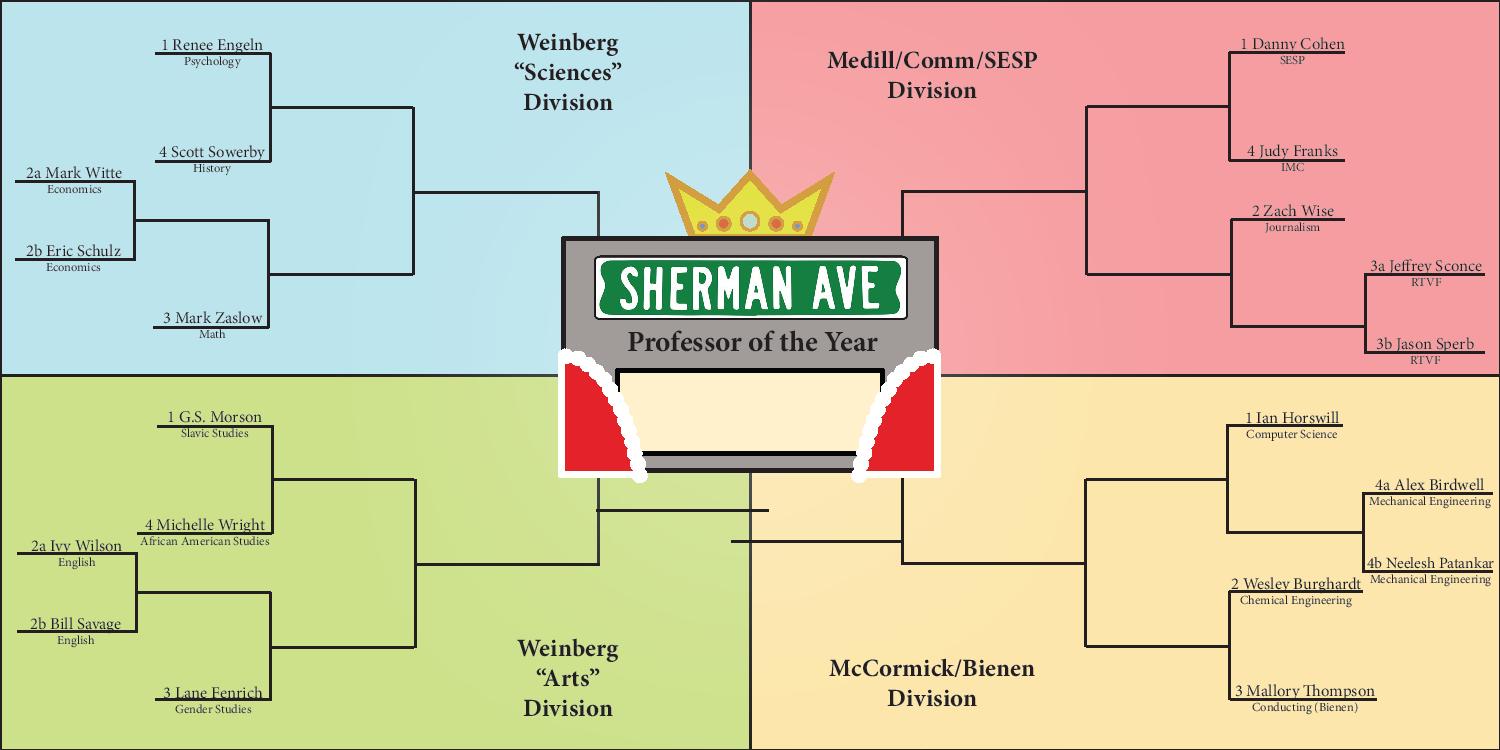Sherman Ave's Professor of the Year Bracket: Play-In Round
 Thank you to all who submitted professor recommendations. After a painstaking selection process, our field of twenty is set. A quick FAQ before moving forward:
Thank you to all who submitted professor recommendations. After a painstaking selection process, our field of twenty is set. A quick FAQ before moving forward:
• “Hey, wait a minute, my favorite professor isn’t on here!”: No, not every great professor is on the bracket. We couldn’t include everyone and had to make some hard cuts and also fully admit that it’s possible that our process missed some real charmers. • “What’s up with those colored rectangles?”: Glad you asked! We’ve divided the field into four regions based on the professors’ schools and departments: the Weinberg “Arts” division, the Weinberg “Sciences” division, the McCormick/Bienen Division and the Medill/Comm/SESP division. In general, the Weinberg “Sciences” division included hard sciences and social sciences, while the “Arts” division included humanities, but there was a little blurring between them. There’s not a ton of logic behind the groupings with the smaller schools, but we felt like it made sense to put Medill and Comm together. • “It looks like someone spent a little too much time in main library on adobe illustrator designing this bracket”: Wow, thanks for noticing! It’s always a good feeling when people appreciate your work. Carefully chosen fonts, perfectly measured bracket lines or subtly-shaded gradients may not be the first thing you notice when you look at a bracket like this, but… okay, okay, fine, next question. • “How was the seeding done?”: There’s some logic to the seeding, but it was done mostly arbitrarily, based on matchups. No one has had all of these professors. Most people haven’t even had a few of them. So to actually seed them accurately would be like trying to select four college football teams that never play each other or virtually any of the same opponents for a playoff [1]. In the end, these are all great professors. Some with really distinguished reputations trended up, but in the end, the seeding had more to do with issues like not wanting two Medill professors to matchup in the first round. • “What’s with the play-in games?”: Great eye, imaginary reader! Because the field included so few professors, we wanted to try to span as many departments as possible. However, for one reason or another, some departments had more than one professor that we felt compelled to include. Rather than make half of an entire region come from one department, we felt like it would be more appropriate (and fun!) to select the department’s representative in a play-in game. There’s one play-in game in each of the four regions. These are the matchups that are going to be decided in this article.
Great questions all around.
[1] And that’s how you get this
RTVF Play-In Game: Sperb vs. Sconce Sperb is one of the most clear, straightforward, and helpful professors in RTVF. The only thing you’ll be confused about is why such a great teacher volunteered to teach a group of 100 riled-up fall quarter freshmen. Sperb is also known for being one of the only professors in RTVF who actually teaches media theory classes, which are sorely underrepresented in the class curriculum. And if for some odd reason you want to take a class on the films of Billy Wilder, Sperb is your guy. His movie taste is also remarkably on point; the only bad movie he showed our class was the french documentary Sans Soleil, which featured not one, but two zebra penises. Sperb knows what he’s doing and the RTVF department would be a much worse place without him. Plus, he’s a film professor who actually wears a fedora, so what more could you want?
Sconce, on the other hand, is the type of teacher you want to take a shot of Fireball with after class. He has the class regularly laughing, and is just filled to the brim with raw emotion. Yes, a lot of that emotion is pure hatred, but it’s entertaining nonetheless. The class especially loves Sconce’s absolutely brutal takedowns of the Big Bang Theory. Seriously, he talks about that show like it murdered his parents and had sex with his childhood dog. Sconce is just such a refreshing professor because he actually has opinions and will actually call people on their bullshit. Not to mention that his film and TV taste is seriously on point- we’ve had screenings of Black Mirror, Broad City, and Idiocracy in class and even watched an Adult Swim infomercial about technologically-advanced pooping at one point. If Sconce had a HBO comedy special, I’d watch it. If he had a TV review column, I’d read it. And if he wanted a teach a freshman protege his skills, he should give me a call. - Doopy Econ Play-In Game: Witte vs. Schulz How fitting that the two representatives of the economics department taught intermediate macroeconomics and intermediate microeconomics this year, respectively. A debate as old as… well, about eighty years. So for as long as my great-aunt has been kvetching about the weather, and the line at the DMV, and “when are you going to find a nice girl and get married? We want more kids in the family. By the time Lenny and I were your age we were raising our second kid, for gods sake!”, economists on either side have been devoting as much of their time as possible explaining why the work that their counterparts are doing is useless. And yet here we have two professors making the case that perhaps what these two disciplines have in common is great teaching, a scathingly dry sense of humor and a knack for some of the most unconventional and hilarious emails you will ever read.
Schulz, as one reader noted, is “a quote machine.” He’s also known for giving incredible life advice based on behavioral econ and psychology research, rewarding students for correct football scores, having students memorize an old ragtime song for a final and generally being refreshingly honest and straightforward. He’s the closest professor you’ll find to your friend’s dad that your friend can’t stand and everyone else loves.
Witte is more like the uncle at your thanksgiving table whose jokes go over everyone’s head. The head of the economics department, he’s known for being a tough, but generally beloved professor. His emails are all-timers and he has an ability to make difficult or confusing topics seem intuitive. In an email last quarter asking students to fill out CTECs, Witte confided, “I will cry for a few days if my numbers come in low, or medium, or below those of my rivals.” That seemed vaguely relevant, but I’ll leave it up to you to figure out how it sways you.
- Jameson the Manatee English Play-In Game: Wilson vs. Savage So my editor has urged me to make my analysis of this first-round matchup as neutral and objective as possible. Which is fine. I’ll play by the rules. Bill Savage and Ivy Wilson are two incredible professors who both deserve to be in this bracket. Either of these two guys could advance all the way, truly – which is why it’s a shame that they’re squared up against each other in what is a bloodbath of a matchup (one could say it is a savage matchup, ha ha!). And like I stated above, my goal is to objectively analyze and preview this matchup and let the reader come to their own conclusions.
I will say, though, that the 2011 film We Bought a Zoo, starring Matt Damon, is directly based on the life of Bill Savage.
Yeah, they changed some of the names and a few of the actual biographical details – the head zookeeper’s name was Katy Foster, not Kelly Foster, as it is in the film – but the heartwarming story about a struggling family man with a heart of gold who purchases a rundown zoo and restores it to its former glory was almost 100% pulled from Professor Savage’s own life experiences. Feel free to ask him about it, if you’re ever at his office hours. He’ll probably deny it, but that’s only because he signed a bad royalties contract and 20th Century Fox legally prohibited him from speaking about the film until 2021. Bottom line, if it wasn’t for Bill Savage, the film We Bought a Zoo would not exist today.
I’m not sure if any films are based on the life of Ivy Wilson. I’ve heard rumors before that the 1995 Kevin Costner post-apocalyptic thriller Waterworld is loosely based on events from Professor Wilson’s life; but that’s only hearsay.
Again, this is a totally objective preview of this matchup…but if you’ve seen the inspirational triumph that is We Bought a Zoo, you’ll know the caliber of man that is Professor Bill Savage. - Prince Giblets Mechanical Engineering Play-In Game: Birdwell vs. Patankar Biden versus Shakespeare. Biden versus the Abominable Snowman. Biden versus Yelp. Birdwell versus Patankar. These are the matchups for which society has yearned for ages, and now one of them is unfolding before your very eyes. One a dark horse underdog and the other a human professor. This is not a pairing to be taken lightly.
Let’s start with Birdwell. In terms of voting population he’s got numbers on his side, as he teaches 3 classes per quarter with an average of about 40 students in each one. However, one of these classes is MechE 224: Experimental Engineering. Now, maybe this class is a benign introduction to methods of engineering innovation and real world systems analysis that has important practical application in students’ future careers. Or maybe, just maybe, this class is the seedling of a post-apocalyptic hell-scape ruled by SkyNet or the machines from the Matrix or a cyborg version of Birdwell himself! Have we learned nothing from the gospel of I, Robot? When you do experiments with science bad things happen and machines kill your friends even though they are supposed to be “3 laws safe.” Whether Alex Birdwell understands the ramifications of teaching such a class remains to be seen, but we cannot stand idly by while this machine war quietly descends upon humanity. He does have really good CTECs, though.
Patankar is another story entirely. He is the expository documentary to Birdwell’s science fiction popcorn flick. Entries in our nominations poll claimed that Patankar’s research is highly disruptive and “single-handedly bringing down the auto industry just for fun.” This piqued my interest, so I did some digging, and found that Patankar’s research is in both “Roughness-induced superhydrophobicity (lotus effect)” and “Simulation of immersed bodies in fluids and their applications.” I’ve racked my brain to try to find the connection between fluids, hydrophobicity and the demise of the automotive industry, and it has led me to a singular conclusion: Neelesh Patankar is assembling a fleet of Duck Trucks to usurp control of American transportation while taking passengers on scenic tours of Boston. Which sounds pretty tight actually, but would probably have serious economic ramifications.
Robot apocalypse or a hare-brained amphibious vehicle takeover scheme: the choice is yours. - Walter Klondike™






